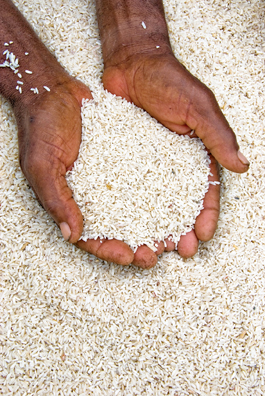home | metro santa cruz index | features | santa cruz | feature story

Rice to The Challenge: A new website lets you do good by doing well at word games.
Hungry for Knowledge
Freerice.com builds vocabulary while feeding the world's poorest. Looks like everyone can win, after all.
By Amanda Yskamp
Doing something to help world hunger is better than doing nothing; let's start there. What can you do? More importantly, what will you do? At Freerice.com, you can play a game that tests the range of your vocabulary and for every right definition gives 20 grains of rice to the United Nations World Food Program to be dispersed the hungry. Click and give. At 20 grains a pop.
1. Teensy means: (a) permanent; (b) suicidal; (c) uncommon; (d) minuscule.
Twenty grains. But how much is 20 grains? Why not just trot into your kitchen and count them? Half a plate of uncooked arborio, one layer deep, every grain tabulated by my 8-year-old, was 421 grains, not counting the ones she dropped.
Cooked, that's not much, but if I play the rice game and Max in Davis and Ali in Bristol and Sophia in Napoli and thousands of others on the wonderful, weird, World Wide Web play the rice game, the molehill grows mountainous. Donations went from 830 grains when the site launched on Oct. 7 to 249,961,700 grains donated on Dec. 10, bringing the total donated to 7,786,631,170 and rising. The figures form an exponential triangle, almost a road map of the web's scope, its power to mobilize.
Freerice.com is the brilliant creation of online fundraising pioneer John Breen. "The site is a viral marketing success story with more than 1 billion grains of rice donated in just one month to help tackle hunger worldwide," says World Food Program executive director Josette Sheeran, noting that hunger claims more lives than AIDS, tuberculosis and malaria combined. The genius of Freerice.com is it makes you feel not only altruistic, but smart. With a series of right answers, your rating goes up, and with it, the difficulty level of the vocabulary questions. Along with those grains of rice tossed to the hungry, the program pitches you weirder, more arcane words.
I find myself thinking of the origins of these words, their rich histories and etymologies, the languages from which they derive. Greek, Latin, Yiddish, Navajo. Of the people who make up the world, who've contributed to what we call our world culture, of our variation and similarities, our ability to conceive of the earth as unified by comprehension and compassion. When contributing to stopping world hunger is so easy, so undemanding, so morally rewarding, and actually fun, why not do it everyday, like walking the dog or doing yoga?
2. Entelechy means: (a) mountain lake; (b) believableness; (c) actuality; (d) sideboard.
At freerice.com, words translate to numbers: There are 29,000 grains of long grain white rice per pound. Freerice.com has fed more than 50,000 people for one day, and more each minute. Advertisers such as Apple computers and Macy's, who are footing the bill for the rice, pay as little as $5 through Google, jockeying with others who bid for ad spots and frequency. Now consider what we each earn hourly at our jobs and the price of rice (89 cents-99 cents per pound). Why not take whatever time you play amassing food 20 grains at a time, and give that much of your hourly wage to a hunger relief group directly? Because it's Freerice.com; you're freely giving your free time. In our houses and offices, at our screens, connected by a flow of information awesome by every definition of the word, it's nothing for us to do something.
The U.N. estimates the cost of ending world hunger completely, along with diseases related to hunger and poverty, at $195 billion a year. Twenty-two countries have pledged to contribute 0.7 percent of their national income to raising this amount. So far, Sweden, Luxembourg, Norway, the Netherlands and Denmark have reached their goals. The United States has not yet set a schedule.
3. Hiemal means: (a) elder; (b) conscientious; (c) rasping; (d) wintry.
In these days of gratitude, miraculous oils, Ujima (the collective work and responsibility of Kwanzaa) and holy birth, amid the consuming and consumerism, shouldn't we be thinking beyond ourselves? The faceless, nameless hungry: we know they are out there somewhere, even as we eat our wild mushroom risotto or demonstrate our eloquence over the local vintage. Do they spoil our savor? Does the $400 meal at the finest restaurant in the land satisfy our hunger? Have we done all we can, or even something? These are some questions to discuss over the next meal.
Answers: (1) d; (2) c; (3) d
Send a letter to the editor about this story.
|
|
|
|
|
|